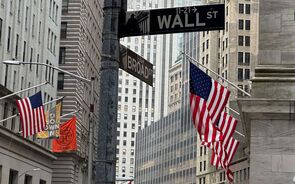Bloomberg - Proxima semana (EUA e EUROPA)
4 mensagens
|Página 1 de 1
Palha..falas deste artigo da Danielle Sessa?
Focus Shifts to Consumer After Elections: U.S. Stocks Outlook
By Danielle Sessa (11/10 09:40
New York, Nov. 10 (Bloomberg) -- U.S. stocks may fall this week on concern slowing consumer spending will curb economic and profit growth.
``The U.S. consumer has been holding up the global economy, and that's not going to continue,'' said Ken Tyszko, who helps oversee $20 billion at Voyageur Asset Management in Chicago. ``I wouldn't be surprised to see the market'' fall to the October lows, he said.
Earnings reports and forecasts from retailers such as Wal- Mart Stores Inc. and Target Corp. may suggest that people are spending less amid rising unemployment, falling consumer confidence and a United Nations resolution demanding unrestricted arms inspections in Iraq.
Iraq is likely to accept the UN resolution, Egypt's official news agency reported. ``The United States, in coalition with other nations, will disarm Saddam Hussein,'' if the Iraqi president fails to obey the UN order, U.S. President George W. Bush said in his weekly radio address.
Tyszko is among money managers who say earnings estimates for the fourth quarter and 2003 are too high. They point to Cisco Systems Inc.'s report last week that quarterly sales may fall and to lower profit forecasts from companies such as McDonald's Corp. and Costco Wholesale Corp. as evidence estimates need to come down.
Analysts predict earnings at Standard & Poor's 500 Index companies will rise 17 percent this quarter from a year earlier and climb 15 percent next year, according to a survey by Thomson First Call. Profit in the third quarter advanced 6.8 percent, based on results from 90 percent of the companies in the index. That's about two-thirds less than analysts had projected at the start of the quarter.
Weekly Moves
The S&P 500 and Nasdaq Composite Index fell for the first week in five, while the Dow Jones Industrial Average rose a fifth week. The S&P 500 dropped 0.7 percent and the Nasdaq 0.1 percent. The Dow gained 0.2 percent.
All three benchmarks are headed toward their third year of declines for the first time since World War II.
Retailers start reporting their third-quarter results this week. Companies scheduled to release quarterly earnings include Wal-Mart, the world's biggest retailer; Target, the second-largest discount retailer; Federated Department Stores Inc.; and Krispy Kreme Doughnuts Inc.
``The retailers have been saying that things are starting to soften up a bit,'' said David Briggs, head equity trader at Federated Investors Inc., which oversees $185 billion in Pittsburgh. ``They are vulnerable if the consumer slows.''
The S&P 500 has climbed 15 percent since touching a five-year low in October. Some investors expect the rally will stall because it has already lasted as long as the index's advance in July and August.
The benchmark gained 21 percent during the 22 days from July 23 to Aug. 22. It fell the next six weeks, touching its lowest since April 1997 on Oct. 9.
Elections, Interest Rates
Stocks rose the first three days of the week as Republicans won control of the U.S. Congress in Tuesday's elections and the Federal Reserve cut interest rates on Wednesday.
The election results led to speculation that Republicans will pass legislation cutting personal and corporate taxes. Drug stocks such as Eli Lilly & Co. gained on expectations Republicans would limit prescription drug coverage in Medicare. Defense shares climbed on the prospects of increased military spending.
The Fed lowered its overnight lending rate by half a percentage point to 1.25 percent to encourage consumers and companies to spend more amid a slowing economy. Unemployment rose to 5.7 percent last month and one measure of consumer confidence dropped to a nine-year low.
The gains and optimism faded as stocks dropped Thursday and Friday. Changes in laws and interest rates may not come fast enough to prevent the economy from sliding back into recession, money managers said.
Iraq Resolution
Stocks were also hurt by the UN Security Council's unanimous vote to adopt a U.S. resolution demanding unrestricted arms inspections in Iraq. The resolution threatens ``serious consequences'' if Saddam Hussein refuses to comply and makes a U.S.-led attack more likely.
``The two major parties will be battling as usual, and the U.S. will still be battling Saddam Hussein and other terrorists around the world,'' Tyszko said. ``Even with the Fed lowering interest rates, it will not magically induce consumers to spend even more.''
Some investors say it's only a matter of time before people curb their purchases. Consumer borrowing rose at a 6.9 percent annual rate in September, according to the Federal Reserve. Personal debt rose a more-than-expected $10 billion in the month as individuals took on credit card, auto-loan and other debt.
The central bank reduced borrowing costs for the first time this year to the lowest level since July 1961. The Fed has trimmed benchmark lending rates 12 times since January 2001 to jump start the economy. The reductions have failed to lift stock prices as the S&P 500 has fallen 33 percent during that stretch.
Gregg Summerville, who manages $500 million at Kirr, Marback & Co., is more optimistic. He's expecting 10 percent to 20 percent returns during the next 12 months because lower interest rates, tax cuts and falling oil prices will support consumer spending.
`Tax Cut for the Consumer'
``The Republicans are going to cut taxes, which will help the consumer'' Summerville said. The ``war premium'' in oil prices that reflects expectations of an attack on Iraq will eventually go away, he said, ``and that is a tax cut for the consumer.''
Summerville sold shares of Kroger Co. because of competition in the supermarket industry from Wal-Mart. He's been buying shares of insurance companies including Aon Corp. because he says declines have made them inexpensive.
Voyageur's Tyszko says there is little incentive for people to increase spending.
``Consumer debt levels are high,'' Tyszko said. ``Anyone who wanted to buy something, whether it's a house or a car, has probably bought one. What are they going to do for an encore?''
By Danielle Sessa (11/10 09:40
New York, Nov. 10 (Bloomberg) -- U.S. stocks may fall this week on concern slowing consumer spending will curb economic and profit growth.
``The U.S. consumer has been holding up the global economy, and that's not going to continue,'' said Ken Tyszko, who helps oversee $20 billion at Voyageur Asset Management in Chicago. ``I wouldn't be surprised to see the market'' fall to the October lows, he said.
Earnings reports and forecasts from retailers such as Wal- Mart Stores Inc. and Target Corp. may suggest that people are spending less amid rising unemployment, falling consumer confidence and a United Nations resolution demanding unrestricted arms inspections in Iraq.
Iraq is likely to accept the UN resolution, Egypt's official news agency reported. ``The United States, in coalition with other nations, will disarm Saddam Hussein,'' if the Iraqi president fails to obey the UN order, U.S. President George W. Bush said in his weekly radio address.
Tyszko is among money managers who say earnings estimates for the fourth quarter and 2003 are too high. They point to Cisco Systems Inc.'s report last week that quarterly sales may fall and to lower profit forecasts from companies such as McDonald's Corp. and Costco Wholesale Corp. as evidence estimates need to come down.
Analysts predict earnings at Standard & Poor's 500 Index companies will rise 17 percent this quarter from a year earlier and climb 15 percent next year, according to a survey by Thomson First Call. Profit in the third quarter advanced 6.8 percent, based on results from 90 percent of the companies in the index. That's about two-thirds less than analysts had projected at the start of the quarter.
Weekly Moves
The S&P 500 and Nasdaq Composite Index fell for the first week in five, while the Dow Jones Industrial Average rose a fifth week. The S&P 500 dropped 0.7 percent and the Nasdaq 0.1 percent. The Dow gained 0.2 percent.
All three benchmarks are headed toward their third year of declines for the first time since World War II.
Retailers start reporting their third-quarter results this week. Companies scheduled to release quarterly earnings include Wal-Mart, the world's biggest retailer; Target, the second-largest discount retailer; Federated Department Stores Inc.; and Krispy Kreme Doughnuts Inc.
``The retailers have been saying that things are starting to soften up a bit,'' said David Briggs, head equity trader at Federated Investors Inc., which oversees $185 billion in Pittsburgh. ``They are vulnerable if the consumer slows.''
The S&P 500 has climbed 15 percent since touching a five-year low in October. Some investors expect the rally will stall because it has already lasted as long as the index's advance in July and August.
The benchmark gained 21 percent during the 22 days from July 23 to Aug. 22. It fell the next six weeks, touching its lowest since April 1997 on Oct. 9.
Elections, Interest Rates
Stocks rose the first three days of the week as Republicans won control of the U.S. Congress in Tuesday's elections and the Federal Reserve cut interest rates on Wednesday.
The election results led to speculation that Republicans will pass legislation cutting personal and corporate taxes. Drug stocks such as Eli Lilly & Co. gained on expectations Republicans would limit prescription drug coverage in Medicare. Defense shares climbed on the prospects of increased military spending.
The Fed lowered its overnight lending rate by half a percentage point to 1.25 percent to encourage consumers and companies to spend more amid a slowing economy. Unemployment rose to 5.7 percent last month and one measure of consumer confidence dropped to a nine-year low.
The gains and optimism faded as stocks dropped Thursday and Friday. Changes in laws and interest rates may not come fast enough to prevent the economy from sliding back into recession, money managers said.
Iraq Resolution
Stocks were also hurt by the UN Security Council's unanimous vote to adopt a U.S. resolution demanding unrestricted arms inspections in Iraq. The resolution threatens ``serious consequences'' if Saddam Hussein refuses to comply and makes a U.S.-led attack more likely.
``The two major parties will be battling as usual, and the U.S. will still be battling Saddam Hussein and other terrorists around the world,'' Tyszko said. ``Even with the Fed lowering interest rates, it will not magically induce consumers to spend even more.''
Some investors say it's only a matter of time before people curb their purchases. Consumer borrowing rose at a 6.9 percent annual rate in September, according to the Federal Reserve. Personal debt rose a more-than-expected $10 billion in the month as individuals took on credit card, auto-loan and other debt.
The central bank reduced borrowing costs for the first time this year to the lowest level since July 1961. The Fed has trimmed benchmark lending rates 12 times since January 2001 to jump start the economy. The reductions have failed to lift stock prices as the S&P 500 has fallen 33 percent during that stretch.
Gregg Summerville, who manages $500 million at Kirr, Marback & Co., is more optimistic. He's expecting 10 percent to 20 percent returns during the next 12 months because lower interest rates, tax cuts and falling oil prices will support consumer spending.
`Tax Cut for the Consumer'
``The Republicans are going to cut taxes, which will help the consumer'' Summerville said. The ``war premium'' in oil prices that reflects expectations of an attack on Iraq will eventually go away, he said, ``and that is a tax cut for the consumer.''
Summerville sold shares of Kroger Co. because of competition in the supermarket industry from Wal-Mart. He's been buying shares of insurance companies including Aon Corp. because he says declines have made them inexpensive.
Voyageur's Tyszko says there is little incentive for people to increase spending.
``Consumer debt levels are high,'' Tyszko said. ``Anyone who wanted to buy something, whether it's a house or a car, has probably bought one. What are they going to do for an encore?''
- Mensagens: 92
- Registado: 5/11/2002 16:03
Bloomberg - Proxima semana (EUA e EUROPA)
Boa tarde;
No Canal Bloomberg, para a proxima semana, estao a prever quedas nas Bolsas, quer nos EUA que na EUROPA.
Qual e a vossa opiniao?
No Canal Bloomberg, para a proxima semana, estao a prever quedas nas Bolsas, quer nos EUA que na EUROPA.
Qual e a vossa opiniao?
- Mensagens: 25
- Registado: 5/11/2002 23:15
4 mensagens
|Página 1 de 1



